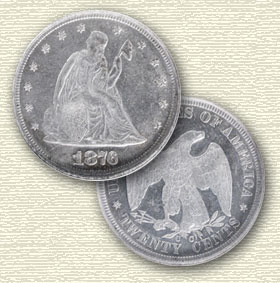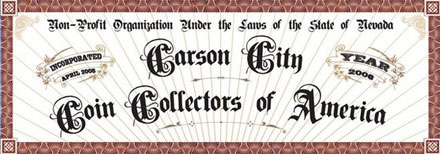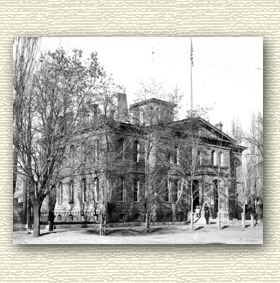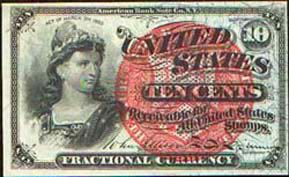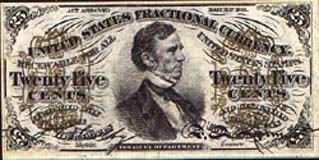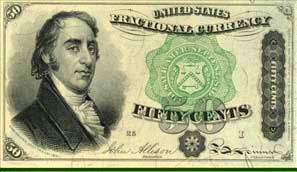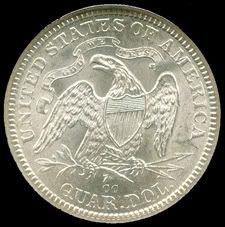- Posts: 177
- Thank you received: 0
1877-CC 25 cents Coin of the Week, Sept. 5, 2010
15 years 4 months ago - 15 years 4 months ago #1485
by LITAS
1877-CC 25 cents Coin of the Week, Sept. 5, 2010 was created by LITAS
1877-CC quater is the easiest to locate in Uncirculated grades, except for the MS-67 specimens.
Mintage: 4,192,000
Survival estimates in all grades: 5,000 - 7,500
Estimated in Uncirculated: 600 - 800
At least 10 different obverse and 10 different reverse dies were employed. Average of 419,200 coins were made per each die pairing.
In 1877 silver supply was plentiful and the federal government was planning to issue millions of dollars in silver coins, which would be used to retire the outstanding fractional currency.
Fractional currency notes were issued from August 21, 1862 through February 15, 1876. During and after the Civil War due to hoarding, there was a shortage of coins. To remedy the situation, the Treasury issued new notes in denominations of 3, 5, 10, 15, 25, and 50 cents.
Like the Three-cent Silver piece produced concurrently, the 3-cent note could be used to buy a three cent stamp, allowing a lonely soldier to send a letter back home.
The U.S. Bureau of Engraving worked ardently to produce notes that would be difficult to counterfeit. Hardly noticeable letters and numbers were hidden like Easter Eggs around designs that had grown as intricate as Oriental mandalas. U.S. govenment tried to keep the business of printing money exclusively in it's hands, however many counterfeiters were gifted in their specialty and were relentless.
Everybody knows what Easter Eggs look like, however only a few have seen how mandala is made. In October of 2005 in Cleveland, Ohio I saw how Tibetan Buddhist monks constructed a mandala. Mandala is a sand painting of Tibet. It took six weeks to do it. After completing the sand mandala, the monks ritually dismantled it and returned sand to nature.
I realize that numismatically this is a stretch, but it is interesting comparison.
In 1877 Treasury was trying to dismantle usage of fractional currency in favor of small denomination coins. However the public response to fractional currency redemptions lagged far behind the government's expectations and a glut of silver coins stockpiled in Treasury vaults.
Also at this time, U.S. silver coins began coming back from foreign nations. For this reason, by the end of 1877 Treasury slammed the brakes on silver coinage production. For example, next year only 996,000 1878-CC quaters were produced.
At present PCGS lists the following prices for 1877-CC quater,
EX-40 $125
AU-55 $300
MS-60 $475
MS-63 $1,200
MS-64 $1,800
MS-65 $3,000
MS-66 $5,500
Uncirculated examples of 1877-CC quarters often exhibit the highest quality of eye appeal characteristics of any of the dates minted at Carson City Mint. Add a few to your collection, while prices are reasonable. An Uncirculated Carson City Mint coin for under $500, what a deal.
Above is an example of one of my 1877-CC quarters.
Rusty in one of his books mentions that there are at least eleven different varieties of the 1877-CC quarter. None of the varieties command a large premium, but a complete certified set would be quite unique to complete. Only ANACS attributes die varieties on Carson City Mint coins.
John Armonas
Mintage: 4,192,000
Survival estimates in all grades: 5,000 - 7,500
Estimated in Uncirculated: 600 - 800
At least 10 different obverse and 10 different reverse dies were employed. Average of 419,200 coins were made per each die pairing.
In 1877 silver supply was plentiful and the federal government was planning to issue millions of dollars in silver coins, which would be used to retire the outstanding fractional currency.
Fractional currency notes were issued from August 21, 1862 through February 15, 1876. During and after the Civil War due to hoarding, there was a shortage of coins. To remedy the situation, the Treasury issued new notes in denominations of 3, 5, 10, 15, 25, and 50 cents.
Like the Three-cent Silver piece produced concurrently, the 3-cent note could be used to buy a three cent stamp, allowing a lonely soldier to send a letter back home.
The U.S. Bureau of Engraving worked ardently to produce notes that would be difficult to counterfeit. Hardly noticeable letters and numbers were hidden like Easter Eggs around designs that had grown as intricate as Oriental mandalas. U.S. govenment tried to keep the business of printing money exclusively in it's hands, however many counterfeiters were gifted in their specialty and were relentless.
Everybody knows what Easter Eggs look like, however only a few have seen how mandala is made. In October of 2005 in Cleveland, Ohio I saw how Tibetan Buddhist monks constructed a mandala. Mandala is a sand painting of Tibet. It took six weeks to do it. After completing the sand mandala, the monks ritually dismantled it and returned sand to nature.
I realize that numismatically this is a stretch, but it is interesting comparison.
In 1877 Treasury was trying to dismantle usage of fractional currency in favor of small denomination coins. However the public response to fractional currency redemptions lagged far behind the government's expectations and a glut of silver coins stockpiled in Treasury vaults.
Also at this time, U.S. silver coins began coming back from foreign nations. For this reason, by the end of 1877 Treasury slammed the brakes on silver coinage production. For example, next year only 996,000 1878-CC quaters were produced.
At present PCGS lists the following prices for 1877-CC quater,
EX-40 $125
AU-55 $300
MS-60 $475
MS-63 $1,200
MS-64 $1,800
MS-65 $3,000
MS-66 $5,500
Uncirculated examples of 1877-CC quarters often exhibit the highest quality of eye appeal characteristics of any of the dates minted at Carson City Mint. Add a few to your collection, while prices are reasonable. An Uncirculated Carson City Mint coin for under $500, what a deal.
Above is an example of one of my 1877-CC quarters.
Rusty in one of his books mentions that there are at least eleven different varieties of the 1877-CC quarter. None of the varieties command a large premium, but a complete certified set would be quite unique to complete. Only ANACS attributes die varieties on Carson City Mint coins.
John Armonas
Last edit: 15 years 4 months ago by LITAS.
Please Log in to join the conversation.
15 years 4 months ago #1486
by Belayoff
C4OA Lifer!
Replied by Belayoff on topic Re:1877-CC 25 cents Coin of the Week, Sept. 5, 2010
John,
An interesting article to say the least. I have never seen a Buddist sand painting though, I have seen Navajo sand paintings from the desert south west.
Belay Off
An interesting article to say the least. I have never seen a Buddist sand painting though, I have seen Navajo sand paintings from the desert south west.
Belay Off
C4OA Lifer!
Please Log in to join the conversation.
15 years 4 months ago #1489
by Garryn
Replied by Garryn on topic Re:1877-CC 25 cents Coin of the Week, Sept. 5, 2010
Nice quarter John and nice examples of fractionals. I have a few myself.
Please Log in to join the conversation.
15 years 4 months ago #1491
by LITAS
Replied by LITAS on topic Re:1877-CC 25 cents Coin of the Week, Sept. 5, 2010
Rusty,
You write that there are 11 different varieties of 1877-CC quarter.
Where one can find the descriptions of each of these varieties?
Thank you.
John A.
You write that there are 11 different varieties of 1877-CC quarter.
Where one can find the descriptions of each of these varieties?
Thank you.
John A.
Please Log in to join the conversation.
15 years 4 months ago #1492
by Carsonite
C4OA Lifer!
Replied by Carsonite on topic Re:1877-CC 25 cents Coin of the Week, Sept. 5, 2010
John,
There are several reference works that attribute the different varieties of Liberty Seated quarters (the 1877-CC included). Many articles in the Liberty Seated Collectors Club publication, Gobrecht Journal, for example, have profiled specific varieties.
The two best works I can refer you to are as follows:
Encyclopedia of United States Liberty Seated Quarters by Larry Briggs
Complete Encyclopedia of U.S. and Colonial Coins by Walter Breen
Happy hunting!
Rusty
There are several reference works that attribute the different varieties of Liberty Seated quarters (the 1877-CC included). Many articles in the Liberty Seated Collectors Club publication, Gobrecht Journal, for example, have profiled specific varieties.
The two best works I can refer you to are as follows:
Encyclopedia of United States Liberty Seated Quarters by Larry Briggs
Complete Encyclopedia of U.S. and Colonial Coins by Walter Breen
Happy hunting!
Rusty
C4OA Lifer!
Please Log in to join the conversation.
Time to create page: 0.181 seconds
